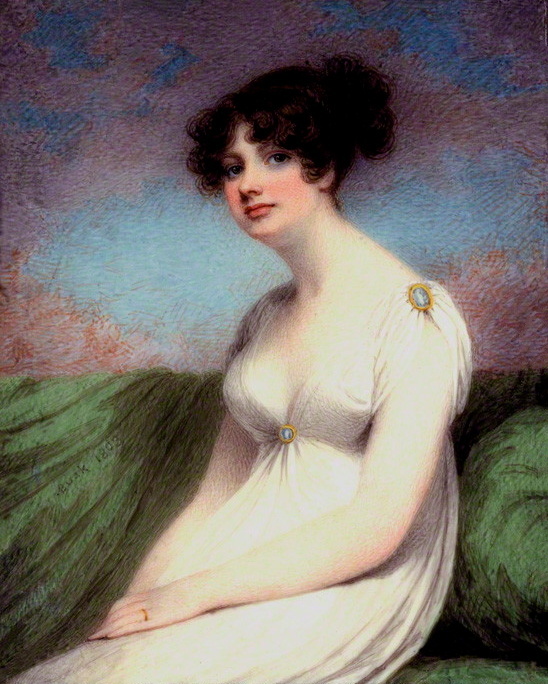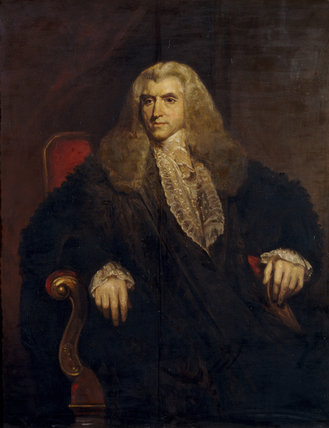Vicary, the mistress and downfall of the Duke of York
Cousin Nicholas recently alerted me to an intriguing literary reference to Vicary Gibbs and his involvement in a national scandal which seems very topical today, leading to the downfall of the Duke of York. Did this usually caustic judge, who earned the nickname ‘Vinegar Vicary’, develop a soft spot for the seductive guile of Mary Anne Clarke?
In 1954 Daphne Du Maurier wrote a novel about her scandalous ancestor ‘Mary Anne‘ (her great-great grandmother), with whom she considered she shared the personality of ‘a woman alone and embattled in a world of men’.
Mary Anne was born into cramped poverty in London, daughter of a humble tradesman, then step-daughter of a printer with whose help she taught herself to read the pamphlets or hysterical acclaims and innuendos. Attractive and intelligent, she married young to a stone mason who went bankrupt and left her with four children.
She became “… a furiously ambitious woman, who learns early that the only way to drag herself away from her mother’s lot of dreary drudgery is to beat men at their own game. She despises men as ‘a race to be subjected’…”

Freed from marriage she used her charm, contacts and favours to secure a town house in Tavistock Place and become established as a high-end courtesan, eventually receiving the attention of Prince Frederick, Duke of York, then the commander-in-chief of the army (after whom the rhyme “The grand old Duke of York, He had ten thousand men…” ). Taking her as his mistress, he set her up in a fashionable residence in Gloucester Place in Marylebone. However, he failed to supply the funds necessary to support their lavish lifestyle.
The ‘friends’ that had guided her into this luxury existence and arranged the introductions had schemes of their own to get rich from her influential position and procured lists of men who would pay to ensure their army promotions. It was a challenging time for the commander-in-chief, with the army ill equipped for war threats on the continent, and parliamentary opposition pushing to professionalise the forces. In January 1809 a motion is submitted in the House of Commons enquiring into the conduct of His Royal Highness the Duke of York, Commander-in-Chief of the Army, respecting promotions, the disposal of commissions and the raising of new levies for the Army. Mary-Anne is called as a witness.

Enter Sir Vicary Gibbs, the Attorney-General. Vicary was the eldest brother of Antony Gibbs, and the most intellectual and successful of the three sons of George Abraham Gibbs of Pytte, who was a surgeon in Exeter.
Vicary attended the local Exeter Grammar School and such was his ability that he became a King’s Scholar at Eton College, and then on to Cambridge as a Craven Scholar at King’s College. He was elected a fellow of the university in 1774, the year before he graduated, remaining so until his marriage.
Vicary always intended to enter the legal profession, enrolling at Lincoln’s Inn and practicing for ten years as a special pleader until he was ‘called to the Bar’. “The acidity of his temper and the sourness of his language .. spared neither litigants, barristers nor criminals”
There are more than a dozen references to Vicary in Daphne du Maurier’s book. As he started his inquisition of Mary Anne “… Sir Vicary Gibbs, the Attorney-General, rose to his feet, and folding his arms in front of him, eyes on the ceiling, began to question the witness. His manner was diffident, gentle, the House knew it well, and settled down to listen, respectfully silent…”.She was plucky in her responses “…and warned that if she persisted in giving her answers in that pert manner she would expose herself to the censure of the House…”
“…The Investigation in the House of Commons now had the entire country fascinated. The Peninsular War was forgotten and thrust aside, and day after day the leading newspapers quoted the full proceedings in their columns. Napoleon and Spain had secondary importance. Pamphleteers ran riot, cartoonists and lampooners cashed in on the Great Discussion, and trade was brisk…”
The outcome for the Duke of York for his sexual shenanigans and corruption was that he was forced to resign from his position (though he was later reinstated). He had moved on to another mistress and cut all ties with Mary Anne
However for Mary Anne her troubles were not over and in 1813 she was prosecuted for libel. In Daphne’s book she contrived to meet again with Vicary … “‘I wanted to meet you,’ she said. ‘There was no other way. Mrs Clarke and Sir Vicary Gibbs make a good combination… The Court of Commons Pleas in Westminster was packed. It might have been Drury Lane on an opening night. Mrs Clarke, in white, with a hat of flimsy straw cocked at an angle, made her appearance to subdued applause… but what surprised them was the Attorney-General’s strangely youthful bearing. The man had lost twenty years, had become debonair. A dog with a dozen tails could not surpass him. As he rose to open the case for the Prosecution he might have been Lancelot himself at Lyonesse. The voice that had sent a chill to so many spines, hard and forbidding, held a new liquid quality. Lush notes came forth like a nightingale’s in spring. ‘An honest, working tradesman has been defrauded. A woman and mother has been wronged.’…”
She sat for the third and last time in the Court of King’s Bench, watching the sea of faces turned towards her; but Sir Vicary Gibbs was no longer there to defend her. He’d become a Judge. Mary Anne was imprisoned for nine months and on her release she was banished to live in France where she died in poverty in Boulogne-sur-Mer in 1852

Comments
Vicary, the mistress and downfall of the Duke of York — No Comments
HTML tags allowed in your comment: <a href="" title=""> <abbr title=""> <acronym title=""> <b> <blockquote cite=""> <cite> <code> <del datetime=""> <em> <i> <q cite=""> <s> <strike> <strong>